A Systematic Review on the Integration of Artificial Intelligence into Energy Management Systems for Electric Vehicles: Recent Advances and Future Perspectives
Abstract
1. Introduction
2. Literature Review Methodology
2.1. Study Selection Criteria
2.1.1. Inclusion Criteria
- Peer-reviewed articles: Only articles that underwent rigorous peer review were included to ensure the credibility and reliability of the findings.
- Publications from the last 10 years (2014–2024): This period was selected as the most appropriate for mapping knowledge in this study’s thematic area. The justification for choosing this timeframe stems from the significant advancements and increasing interest in integrating AI into EMSs for EVs during this period. As highlighted in the preliminary research and Introduction, the past decade saw rapid developments in AI techniques, such as machine learning, deep learning, and genetic algorithms, which have significantly impacted EV performance, energy efficiency, and range. This period allowed for capturing both the evolution of these technologies and the most recent advancements.
- Studies focusing on the application of AI in EMSs specifically for EVs: This criterion ensured the relevance of the articles to the core research question.
- Research that includes experimental results, case studies, simulations, or real-world implementations: This criterion ensured that the studies provided practical insights and evidence of the effectiveness of AI techniques in EMSs for EVs.
- Articles written in English: This criterion maintained consistency and accessibility in the analysis.
2.1.2. Exclusion Criteria
- Conference and review papers: These were excluded to focus on original research articles that provide detailed methodologies and experimental results.
- Non-peer-reviewed articles, editorials, commentaries, and opinion pieces: These types of publications were excluded to maintain a preference for primary sources and to ensure the rigor and credibility of the works included in this review.
- Publications older than 10 years: Older publications were excluded to keep this review focused on recent advancements.
- Studies not directly related to EMSs or EVs: This criterion maintained the relevance of this literature review.
- Articles not available in full text: This criterion ensured that all reviewed articles could be thoroughly analyzed.
- Duplicate studies or those with insufficient methodological details: This criterion avoided redundancy and ensured methodological rigor.
2.2. Literature Search Process
2.3. Selection of Studies and Eligibility
- Artificial Intelligence in EV Energy Management: This topic encompasses articles that apply AI techniques such as machine learning, deep learning, and genetic algorithms in the EMSs of EVs. These studies explore how AI can optimize energy consumption, predict energy demand, and enhance the overall efficiency of EV operations.
- Optimization Techniques in Energy Management Systems: Articles under this topic discuss various optimization algorithms and techniques designed to enhance the efficiency and performance of EMSs in EVs. These include traditional optimization methods and advanced algorithms tailored to improve EVs’ operational efficiency and energy utilization.
- Battery Management Systems: This category includes articles on the management, monitoring, and optimization of battery systems in EVs. Key areas of focus within this topic are estimating the state of charge (SoC), lifecycle management of batteries, and strategies to ensure the longevity and reliability of battery systems through advanced monitoring and control techniques.
- Renewable Energy Integration: Articles exploring integrating renewable energy sources, such as solar and wind power, into the EMSs of EVs fall under this topic. These studies examine how renewable energy can be efficiently harnessed and managed to support the sustainable operation of EVs, thus contributing to a greener and more sustainable energy landscape.
- Smart Grids and Electric Vehicles: This topic covers articles examining the interaction between smart grids and EVs. Key areas of interest include grid stability, demand response strategies, and the impact of EV integration on smart grid infrastructure. These studies investigate how EVs can be integrated into smart grids to enhance grid efficiency, stability, and resilience and the potential benefits and challenges.
3. Descriptive Analysis of the Literature
3.1. Artificial Intelligence in EV Energy Management
3.1.1. Description
3.1.2. Current State and Recent Advances
3.1.3. Industrial Adoption
3.1.4. Trends and Future Challenges
3.2. Optimization Techniques in EMSs
3.2.1. Description
3.2.2. Current State
3.2.3. Trends and Future Challenges
3.3. Battery Management Systems
3.3.1. Description
3.3.2. Current State
3.3.3. Trends and Future Challenges
3.3.4. Advantages and Shortcomings of AI Technologies in BMSs for EVs
3.3.5. Shortcomings and Challenges of Applying AI in BMSs for EVs
3.4. Renewable Energy Integration
3.4.1. Description
3.4.2. Current State, Projects, and Impact
3.4.3. Trends and Future Challenges
3.5. Smart Grids and EVs
3.5.1. Description
3.5.2. Current State and Implementations
3.5.3. Trends and Future Challenges
4. Discussion
5. Conclusions
Author Contributions
Funding
Data Availability Statement
Acknowledgments
Conflicts of Interest
Appendix A
Overall Information of the Selected Studies for This Literature Review
References
- Oladosu, T.L.; Pasupuleti, J.; Kiong, T.S.; Koh, S.P.J.; Yusaf, T. Energy management strategies, control systems, and artificial intelligence-based algorithms development for hydrogen fuel cell-powered vehicles: A review. Int. J. Hydrogen Energy 2024, 61, 1380–1404. [Google Scholar] [CrossRef]
- Khalatbarisoltani, A.; Zhou, H.; Tang, X.; Kandidayeni, M.; Boulon, L.; Hu, X. Energy Management Strategies for Fuel Cell Vehicles: A Comprehensive Review of the Latest Progress in Modeling, Strategies, and Future Prospects. IEEE Trans. Intell. Transp. Syst. 2023, 25, 14–32. [Google Scholar] [CrossRef]
- Ouramdane, O.; Elbouchikhi, E.; Amirat, Y.; Gooya, E.S. Optimal Sizing and Energy Management of Microgrids with Vehicle-to-Grid Technology: A Critical Review and Future Trends. Energies 2021, 14, 4166. [Google Scholar] [CrossRef]
- Sankarkumar, R.S.; Natarajan, R. Energy management techniques and topologies suitable for hybrid energy storage system powered electric vehicles: An overview. Int. Trans. Electr. Energy Syst. 2021, 31, 12819. [Google Scholar] [CrossRef]
- Shakeel, F.M.; Malik, O.P. ANFIS Based Energy Management System for V2G Integrated Micro-Grids. Electr. Power Compon. Syst. 2022, 50, 584–599. [Google Scholar] [CrossRef]
- Adnane, M.; Nguyen, C.T.P.; Khoumsi, A.; Trovao, J.P.F. Real-Time Torque-Distribution for Dual-Motor Off-Road Vehicle Using Machine Learning Approach. IEEE Trans. Veh. Technol. 2024, 73, 4567–4577. [Google Scholar] [CrossRef]
- Yavuz, M.; Kivanc, O.C. Optimization of a Cluster-Based Energy Management System Using Deep Reinforcement Learning Without Affecting Prosumer Comfort: V2X Technologies and Peer-to-Peer Energy Trading. IEEE Access 2024, 12, 31551–31575. [Google Scholar] [CrossRef]
- Pardhasaradhi, B.; Shilaja, C. A deep reinforced markov action learning based hybridized energy management strategy for electric vehicle application. J. Energy Storage 2023, 74, 109373. [Google Scholar] [CrossRef]
- Vermesan, O.; John, R.; Pype, P.; Daalderop, G.; Kriegel, K.; Mitic, G.; Lorentz, V.; Bahr, R.; Sand, H.E.; Bockrath, S.; et al. Automotive Intelligence Embedded in Electric Connected Autonomous and Shared Vehicles Technology for Sustainable Green Mobility. Front. Future Transp. 2021, 2, 688482. [Google Scholar] [CrossRef]
- Vodovozov, V.; Raud, Z.; Petlenkov, E.; Vodovozov, V.; Raud, Z.; Petlenkov, E. Review on Braking Energy Management in Electric Vehicles. Energies 2021, 14, 4477. [Google Scholar] [CrossRef]
- Miah, M.S.; Lipu, M.S.H.; Meraj, S.T.; Hasan, K.; Ansari, S.; Jamal, T.; Masrur, H.; Elavarasan, R.M.; Hussain, A.; Miah, M.S.; et al. Optimized Energy Management Schemes for Electric Vehicle Applications: A Bibliometric Analysis towards Future Trends. Sustainability 2021, 13, 12800. [Google Scholar] [CrossRef]
- Lin, Y.; Chu, L.; Hu, J.; Hou, Z.; Li, J.; Jiang, J.; Zhang, Y. Progress and summary of reinforcement learning on energy management of MPS-EV. Heliyon 2024, 10, e23014. [Google Scholar] [CrossRef] [PubMed]
- Panaparambil, V.S.; Kashyap, Y.; Castelino, R.V. A review on hybrid source energy management strategies for electric vehicle. Int. J. Energy Res. 2021, 45, 7107. [Google Scholar] [CrossRef]
- Badran, M.A.; Toha, S.F. Employment of Artificial Intelligence (AI) Techniques in Battery Management System (BMS) for Electric Vehicles (EV): Issues and Challenges. Pertanika J. Sci. Technol. 2024, 32, 859–881. [Google Scholar] [CrossRef]
- Chougule, S.B.; Chaudhari, B.S.; Ghorpade, S.N.; Zennaro, M. Exploring Computing Paradigms for Electric Vehicles: From Cloud to Edge Intelligence, Challenges and Future Directions. World Electr. Veh. J. 2024, 15, 39. [Google Scholar] [CrossRef]
- Khan, M.R.; Haider, Z.M.; Malik, F.H.; Almasoudi, F.M.; Alatawi, K.S.S.; Bhutta, M.S. A Comprehensive Review of Microgrid Energy Management Strategies Considering Electric Vehicles, Energy Storage Systems, and AI Techniques. Processes 2024, 12, 270. [Google Scholar] [CrossRef]
- Ghalkhani, M.; Habibi, S. Review of the Li-Ion Battery, Thermal Management, and AI-Based Battery Management System for EV Application. Energies 2023, 16, 185. [Google Scholar] [CrossRef]
- Du, R.; Xiao, J.; Chang, S.; Zhao, L.; Wei, K.; Zhang, W.; Zou, H.; Du, R.; Xiao, J.; Chang, S.; et al. Mechanical energy harvesting in traffic environment and its application in smart transportation. J. Phys. D Appl. Phys. 2023, 56, 373002. [Google Scholar] [CrossRef]
- Naqvi, S.S.A.; Jamil, H.; Faseeh, M.; Iqbal, N.; Khan, S.; Kim, D.-H. A comprehensive review on development strategies of integrated electronic control units in IoEVs for energy management. Internet Things 2024, 25, 101085. [Google Scholar] [CrossRef]
- Mololoth, V.K.; Saguna, S.; Åhlund, C.; Mololoth, V.K.; Saguna, S.; Åhlund, C. Blockchain and Machine Learning for Future Smart Grids: A Review. Energies 2023, 16, 528. [Google Scholar] [CrossRef]
- Zhang, L.; Hu, X.; Wang, Z.; Sun, F.; Dorrell, D.G. A review of supercapacitor modeling, estimation, and applications: A control/management perspective. Renew. Sustain. Energy Rev. 2018, 81, 1868–1878. [Google Scholar] [CrossRef]
- Hasan, M.K.; Habib, A.A.; Islam, S.; Balfaqih, M.; Alfawaz, K.M.; Singh, D.; Hasan, M.K.; Habib, A.A.; Islam, S.; Balfaqih, M.; et al. Smart Grid Communication Networks for Electric Vehicles Empowering Distributed Energy Generation: Constraints, Challenges, and Recommendations. Energies 2023, 16, 1140. [Google Scholar] [CrossRef]
- García-Villalobos, J.; Zamora, I.; San Martín, J.I.; Asensio, F.J.; Aperribay, V. Plug-in electric vehicles in electric distribution networks: A review of smart charging approaches. Renew. Sustain. Energy Rev. 2014, 38, 717–731. [Google Scholar] [CrossRef]
- Geertsma, R.D.; Negenborn, R.R.; Visser, K.; Hopman, J.J. Design and control of hybrid power and propulsion systems for smart ships: A review of developments. Appl. Energy 2017, 194, 30–54. [Google Scholar] [CrossRef]
- Ye, Y.; Qiu, D.; Wang, H.; Tang, Y.; Strbac, G.; Ye, Y.; Qiu, D.; Wang, H.; Tang, Y.; Strbac, G. Real-Time Autonomous Residential Demand Response Management Based on Twin Delayed Deep Deterministic Policy Gradient Learning. Energies 2021, 14, 531. [Google Scholar] [CrossRef]
- Page, M.J.; McKenzie, J.E.; Bossuyt, P.M.; Boutron, I.; Hoffmann, T.C.; Mulrow, C.D.; Shamseer, L.; Tetzlaff, J.M.; Akl, E.A.; Brennan, S.E.; et al. The PRISMA 2020 statement: An updated guideline for reporting systematic reviews. Int. J. Surg. 2021, 88, 105906. [Google Scholar] [CrossRef]
- Maino, C.; Mastropietro, A.; Sorrentino, L.; Busto, E.; Misul, D.; Spessa, E.; Maino, C.; Mastropietro, A.; Sorrentino, L.; Busto, E.; et al. Project and Development of a Reinforcement Learning Based Control Algorithm for Hybrid Electric Vehicles. Appl. Sci. 2022, 12, 812. [Google Scholar] [CrossRef]
- Xu, T.; Chen, T.; Gao, C.; Hui, H. Intelligent Home Energy Management Strategy With Internal Pricing Mechanism Based on Multiagent Artificial Intelligence-of-Things. IEEE Syst. J. 2023, 17, 6045–6056. [Google Scholar] [CrossRef]
- Hu, B.; Zhang, S.; Liu, B. A Hybrid Algorithm Combining Data-Driven and Simulation-Based Reinforcement Learning Approaches to Energy Management of Hybrid Electric Vehicles. IEEE Trans. Transp. Electrif. 2024, 10, 1257–1273. [Google Scholar] [CrossRef]
- Feddaoui, O.; Toufouti, R.; Labed, D.; Meziane, S. Control of an isolated microgrid including renewable energy resources. Serbian J. Electr. Eng. 2020, 17, 297–321. [Google Scholar] [CrossRef]
- Hadraoui, H.E.; Zegrari, M.; Hammouch, F.-E.; Guennouni, N.; Laayati, O.; Chebak, A.; El Hadraoui, H.; Zegrari, M.; Hammouch, F.-E.; Guennouni, N.; et al. Design of a Customizable Test Bench of an Electric Vehicle Powertrain for Learning Purposes Using Model-Based System Engineering. Sustainability 2022, 14, 10923. [Google Scholar] [CrossRef]
- Cavanini, L.; Ciabattoni, L.; Ferracuti, F.; Marchegiani, E.; Monteriù, A. A comparative study of driver torque demand prediction methods. IET Intell. Transp. Syst. 2023, 17, 12278. [Google Scholar] [CrossRef]
- Lin, Y.J.; Chen, Y.C.; Zheng, J.Y.; Chu, D.; Shao, D.W.; Yang, H.T. Blockchain Power Trading and Energy Management Platform. IEEE Access 2022, 10, 75932–75948. [Google Scholar] [CrossRef]
- A backpropagation neural network-based hybrid energy recognition and management system. Energy 2024, 297, 131264. [CrossRef]
- Le, T.T.; Priya, J.C.; Le, H.C.; Le, N.V.L.; Duong, M.T.; Cao, D.N. Harnessing artificial intelligence for data-driven energy predictive analytics: A systematic survey towards enhancing sustainability. Int. J. Renew. Energy Dev. 2024, 13, 60119. [Google Scholar] [CrossRef]
- Fayyazi, M.; Sardar, P.; Thomas, S.I.; Daghigh, R.; Jamali, A.; Esch, T.; Kemper, H.; Langari, R.; Khayyam, H.; Fayyazi, M.; et al. Artificial Intelligence/Machine Learning in Energy Management Systems, Control, and Optimization of Hydrogen Fuel Cell Vehicles. Sustainability 2023, 15, 5249. [Google Scholar] [CrossRef]
- Huang, R.; He, H. A novel data-driven energy management strategy for fuel cell hybrid electric bus based on improved twin delayed deep deterministic policy gradient algorithm. Int. J. Hydrogen Energy 2024, 52, 335. [Google Scholar] [CrossRef]
- Tresca, L.; Pulvirenti, L.; Rolando, L.; Millo, F. Development of a deep Q-learning energy management system for a hybrid electric vehicle. Transp. Eng. 2024, 16, 100241. [Google Scholar] [CrossRef]
- Ma, Y.; Chen, X.; Wang, L.; Yang, J. Study on Smart Home Energy Management System Based on Artificial Intelligence. J. Sens. 2021, 2021, 9101453. [Google Scholar] [CrossRef]
- Binyamin, S.S.; Ben Slama, S.A.; Zafar, B. Artificial intelligence-powered energy community management for developing renewable energy systems in smart homes. Energy Strategy Rev. 2024, 51, 101288. [Google Scholar] [CrossRef]
- Senyapar, H.N.D.; Bayindir, R.; Senyapar, H.N.D.; Bayindir, R. The Research Agenda on Smart Grids: Foresights for Social Acceptance. Energies 2023, 16, 6439. [Google Scholar] [CrossRef]
- Teimoori, Z.; Yassine, A.; Lu, C. Deep Transfer learning for detecting electric vehicles highly-correlated energy consumption parameters. IEEE Trans. Artif. Intell. 2024, 1, 3358796. [Google Scholar] [CrossRef]
- Laayati, O.; Hadraoui, H.E.; Magharaoui, A.E.; El-Bazi, N.; Bouzi, M.; Chebak, A.; Guerrero, J.M.; Laayati, O.; El Hadraoui, H.; El Magharaoui, A.; et al. An AI-Layered with Multi-Agent Systems Architecture for Prognostics Health Management of Smart Transformers: A Novel Approach for Smart Grid-Ready Energy Management Systems. Energies 2022, 15, 7217. [Google Scholar] [CrossRef]
- Liu, Y.; Zhang, D.; Gooi, H.B. Optimization strategy based on deep reinforcement learning for home energy management. J. Power Energy Syst. 2020, 6, 2890. [Google Scholar] [CrossRef]
- Abulifa, A.A.; Che Soh, A.; Hassan, M.K.; Raja Ahmad, R.M.K.; Mohd Radzi, M.A. Energy Management System in Battery Electric Vehicle Based on Fuzzy Logic Control to Optimize the Energy Consumption in HVAC System. Int. J. Integr. Eng. 2019, 11, 2. [Google Scholar] [CrossRef][Green Version]
- Jondhle, H.; Nandgaonkar, A.B.; Nalbalwar, S.; Jondhle, S. An artificial intelligence and improved optimization-based energy management system of battery-fuel cell-ultracapacitor in hybrid electric vehicles. J. Energy Storage 2023, 74, 109079. [Google Scholar] [CrossRef]
- Mejdi, L.; Kardous, F.; Grayaa, K. Machine Learning-Based Online MPC for Large-Scale Charging Infrastructure Management. IEEE Access 2024, 12, 36896–36907. [Google Scholar] [CrossRef]
- Zhang, H.; Chen, B.; Lei, N.; Li, B.; Li, R.; Wang, Z.; Zhang, H.; Chen, B.; Lei, N.; Li, B.; et al. Integrated Thermal and Energy Management of Connected Hybrid Electric Vehicles Using Deep Reinforcement Learning. IEEE Trans. Transp. Electrif. 2023, 10, 4594–4603. [Google Scholar] [CrossRef]
- Zhang, C.; Zhou, Q.; Shuai, B.; Williams, H.; Li, Y.; Hua, L.; Xu, H. Dedicated Adaptive Particle Swarm Optimization Algorithm for Digital Twin Based Control Optimization of the Plug-In Hybrid Vehicle. IEEE Trans. Transp. Electrif. 2023, 9, 3137–3148. [Google Scholar] [CrossRef]
- Kumar, V.C.; Chaturvedi, A.; Arvin, A.T.; Srinivas, P.V.V.S.; Ranjit, P.S.; Rastogi, R.; Arun, M.R.; Rajaram, A. AI-IOT-Based Adaptive Control Techniques for Electric Vehicles. Electr. Power Compon. Syst. 2024, 1, 1–19. [Google Scholar] [CrossRef]
- Zhou, Q.; Zhao, D.; Shuai, B.; Li, Y.; Williams, H.; Xu, H. Knowledge Implementation and Transfer With an Adaptive Learning Network for Real-Time Power Management of the Plug-in Hybrid Vehicle. IEEE Trans. Neural Netw. Learn. Syst. 2021, 32, 5298–5308. [Google Scholar] [CrossRef] [PubMed]
- Fiorotti, R.; Rocha, H.R.O.; Coutinho, C.R.; Rueda-Medina, A.C.; Nardoto, A.F.; Fardin, J.F. A novel strategy for simultaneous active/reactive power design and management using artificial intelligence techniques. Energy Convers. Manag. 2023, 294, 117565. [Google Scholar] [CrossRef]
- Ferrández-Pastor, F.J.; García-Chamizo, J.M.; Gomez-Trillo, S.; Valdivieso-Sarabia, R.; Nieto-Hidalgo, M. Smart Management Consumption in Renewable Energy Fed Ecosystems. Sensors 2019, 19, 2967. [Google Scholar] [CrossRef] [PubMed]
- Hu, B.; Li, J. An Adaptive Hierarchical Energy Management Strategy for Hybrid Electric Vehicles Combining Heuristic Domain Knowledge and Data-Driven Deep Reinforcement Learning. IEEE Trans. Transp. Electrif. 2021, 8, 3275–3288. [Google Scholar] [CrossRef]
- Chen, Y.-Y.; Lin, Y.-H.; Chen, Y.-Y.; Lin, Y.-H. A Smart Autonomous Time- and Frequency-Domain Analysis Current Sensor-Based Power Meter Prototype Developed over Fog-Cloud Analytics for Demand-Side Management. Sensors 2019, 19, 4443. [Google Scholar] [CrossRef] [PubMed]
- Joshi, A.; Capezza, S.; Alhaji, A.; Chow, M.-Y. Survey on AI and Machine Learning Techniques for Microgrid Energy Management Systems. IEEE/CAA J. Autom. Sin. 2023, 10, 1513–1529. [Google Scholar] [CrossRef]
- Linan-Reyes, M.; Garrido-Zafra, J.; Gil-de-Castro, A.; Moreno-Munoz, A.; Linan-Reyes, M.; Garrido-Zafra, J.; Gil-de-Castro, A.; Moreno-Munoz, A. Energy Management Expert Assistant, a New Concept. Sensors 2021, 21, 5915. [Google Scholar] [CrossRef] [PubMed]
- Vieira, R.N.; Villanueva, J.M.M.; Flores, T.K.S.; Macêdo, E.C.T.; Navega Vieira, R.; Mauricio Villanueva, J.M.; Sales Flores, T.K.; Tavares de Macêdo, E.C. State of Charge Estimation of Battery Based on Neural Networks and Adaptive Strategies with Correntropy. Sensors 2022, 22, 1179. [Google Scholar] [CrossRef] [PubMed]
- Bhattacharya, S.; Chengoden, R.; Srivastava, G.; Alazab, M.; Javed, A.R.; Victor, N.; Maddikunta, P.K.R.; Gadekallu, T.R.; Bhattacharya, S.; Chengoden, R.; et al. Incentive Mechanisms for Smart Grid: State of the Art, Challenges, Open Issues, Future Directions. Big Data Cogn. Comput. 2022, 6, 47. [Google Scholar] [CrossRef]
- Mazhar, T.; Asif, R.N.; Malik, M.A.; Nadeem, M.A.; Haq, I.; Iqbal, M.; Kamran, M.; Ashraf, S.; Mazhar, T.; Asif, R.N.; et al. Electric Vehicle Charging System in the Smart Grid Using Different Machine Learning Methods. Sustainability 2023, 15, 2603. [Google Scholar] [CrossRef]
- Shanmuganathan, J.; Victoire, A.A.; Balraj, G.; Victoire, A.; Shanmuganathan, J.; Victoire, A.A.; Balraj, G.; Victoire, A. Deep Learning LSTM Recurrent Neural Network Model for Prediction of Electric Vehicle Charging Demand. Sustainability 2022, 14, 10207. [Google Scholar] [CrossRef]
- Yoon, G.; Kim, S.; Shin, H.; Cho, K.; Jang, H.; Lee, T.; Choi, M.-i.; Kang, B.; Park, S.; Lee, S.; et al. Carbon-Neutral ESG Method Based on PV Energy Generation Prediction Model in Buildings for EV Charging Platform. Buildings 2023, 13, 2098. [Google Scholar] [CrossRef]
- Martínez-Caballero, L.; Kot, R.; Milczarek, A.; Malinowski, M.; Martínez-Caballero, L.; Kot, R.; Milczarek, A.; Malinowski, M. Comparison of Energy Storage Management Techniques for a Grid-Connected PV- and Battery-Supplied Residential System. Electronics 2023, 13, 87. [Google Scholar] [CrossRef]
- Amer, A.; Shaban, K.; Massoud, A.; Amer, A.; Shaban, K.; Massoud, A. Demand Response in HEMSs Using DRL and the Impact of Its Various Configurations and Environmental Changes. Energies 2022, 15, 8235. [Google Scholar] [CrossRef]
- Elkholy, M.; Senjyu, T.; Elymany, M.; Gamil, M.M.; Talaat, M.; Masrur, H.; Ueda, S.; Lotfy, M.E. Optimal resilient operation and sustainable power management within an autonomous residential microgrid using African vultures optimization algorithm. Renew. Energy 2024, 224, 120247. [Google Scholar] [CrossRef]
- Mahjoub, S.; Chrifi-Alaoui, L.; Drid, S.; Derbel, N.; Mahjoub, S.; Chrifi-Alaoui, L.; Drid, S.; Derbel, N. Control and Implementation of an Energy Management Strategy for a PV–Wind–Battery Microgrid Based on an Intelligent Prediction Algorithm of Energy Production. Energies 2023, 16, 1883. [Google Scholar] [CrossRef]
- Alam, M.M.; Rahman, M.H.; Ahmed, M.F.; Chowdhury, M.Z.; Jang, Y.M.; Alam, M.M.; Rahman, M.H.; Ahmed, M.F.; Chowdhury, M.Z.; Jang, Y.M. Deep learning based optimal energy management for photovoltaic and battery energy storage integrated home micro-grid system. Sci. Rep. 2022, 12, 19147. [Google Scholar] [CrossRef]
- Bouramdane, A.-A.; Bouramdane, A.-A. Cyberattacks in Smart Grids: Challenges and Solving the Multi-Criteria Decision-Making for Cybersecurity Options, Including Ones That Incorporate Artificial Intelligence, Using an Analytical Hierarchy Process. J. Cybersecur. Priv. 2023, 3, 662–705. [Google Scholar] [CrossRef]
- Zhou, Y.; Liu, J. Advances in emerging digital technologies for energy efficiency and energy integration in smart cities. Energy Build. 2024, 315, 114289. [Google Scholar] [CrossRef]
- Rojek, I.; Mroziński, A.; Kotlarz, P.; Macko, M.; Mikołajewski, D.; Rojek, I.; Mroziński, A.; Kotlarz, P.; Macko, M.; Mikołajewski, D. AI-Based Computational Model in Sustainable Transformation of Energy Markets. Energies 2023, 16, 8059. [Google Scholar] [CrossRef]
- Zhang, R.; Li, X.; Sun, C.; Yang, S.; Tian, Y.; Tian, J.; Zhang, R.; Li, X.; Sun, C.; Yang, S.; et al. State of Charge and Temperature Joint Estimation Based on Ultrasonic Reflection Waves for Lithium-Ion Battery Applications. Batteries 2023, 9, 335. [Google Scholar] [CrossRef]
- Tang, X.; Shi, L.; Zhang, Y.; Li, B.; Xu, S.; Song, Z. Degradation adaptive energy management strategy for FCHEV based on the Rule-DDPG method: Tailored to the current SOH of the powertrain. IEEE Trans. Transp. Electrif. 2024, 1, 1. [Google Scholar] [CrossRef]
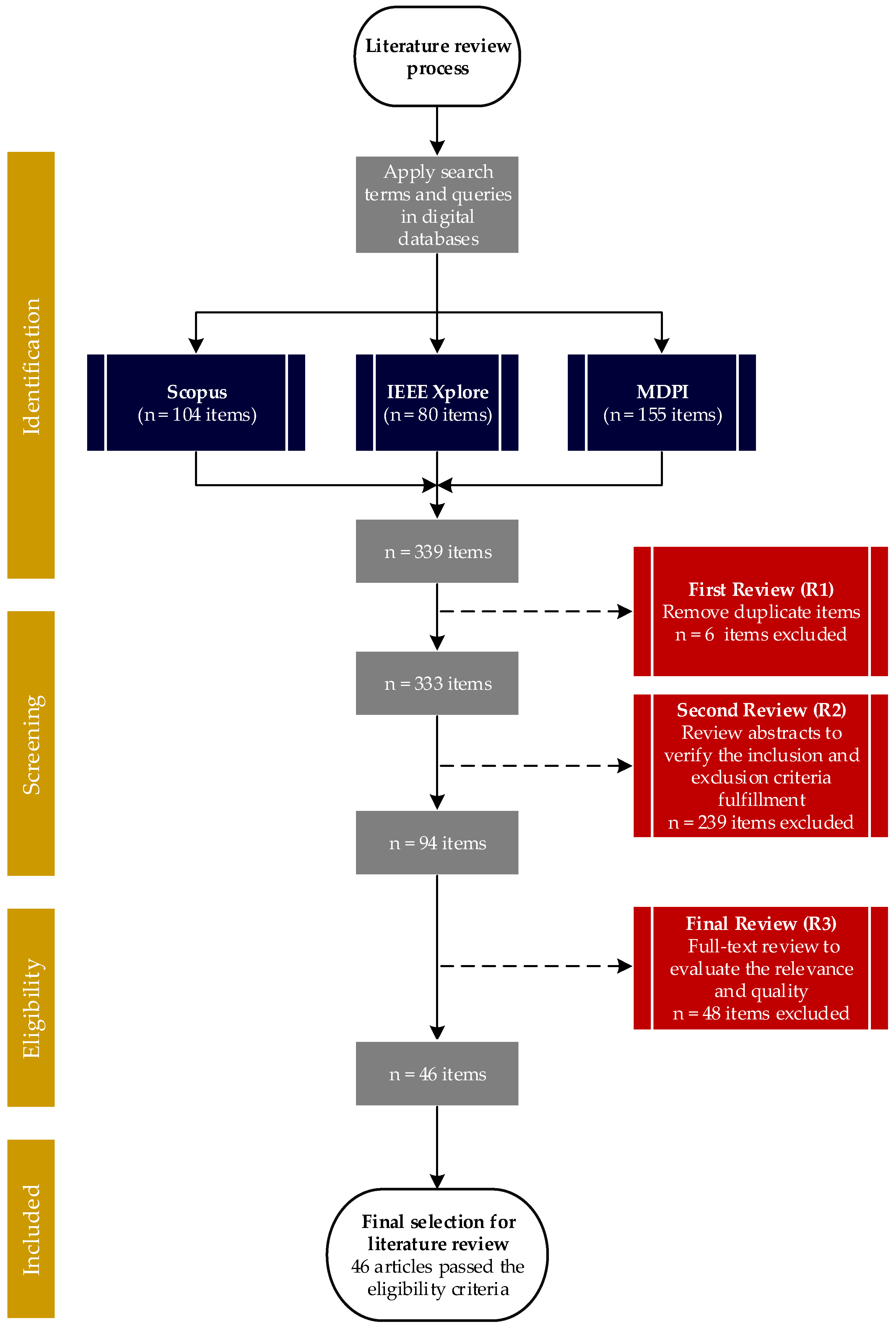
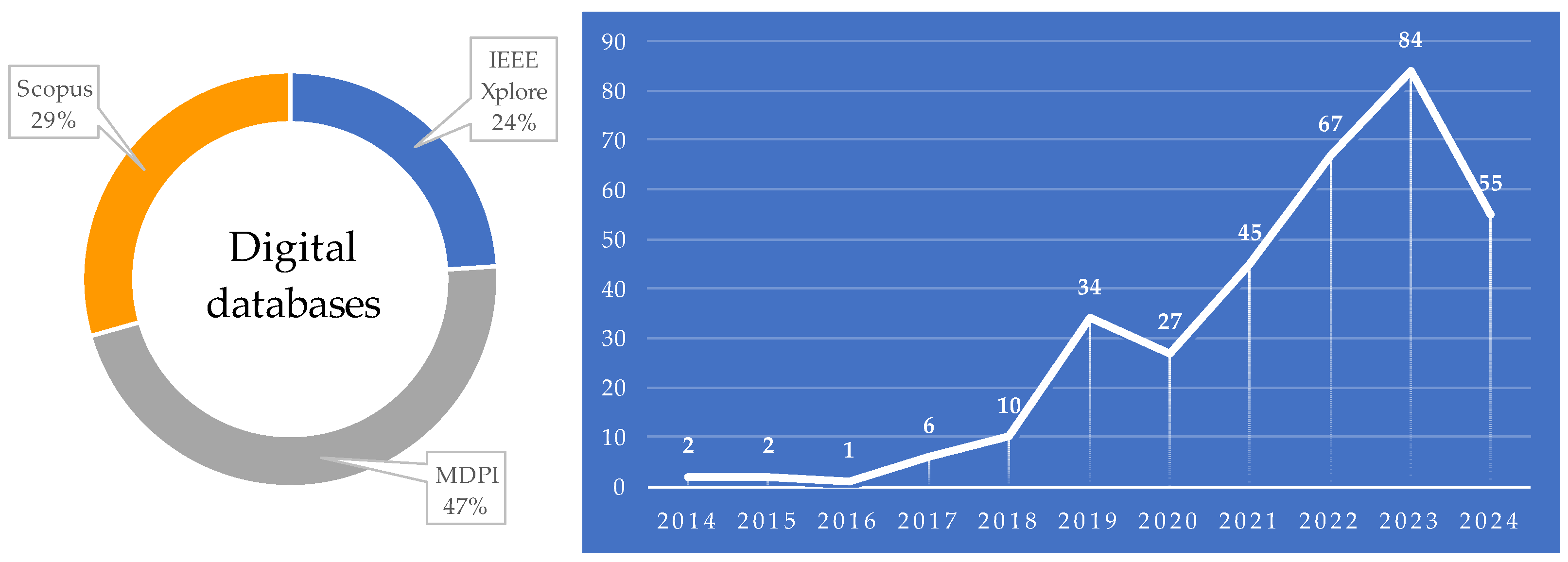
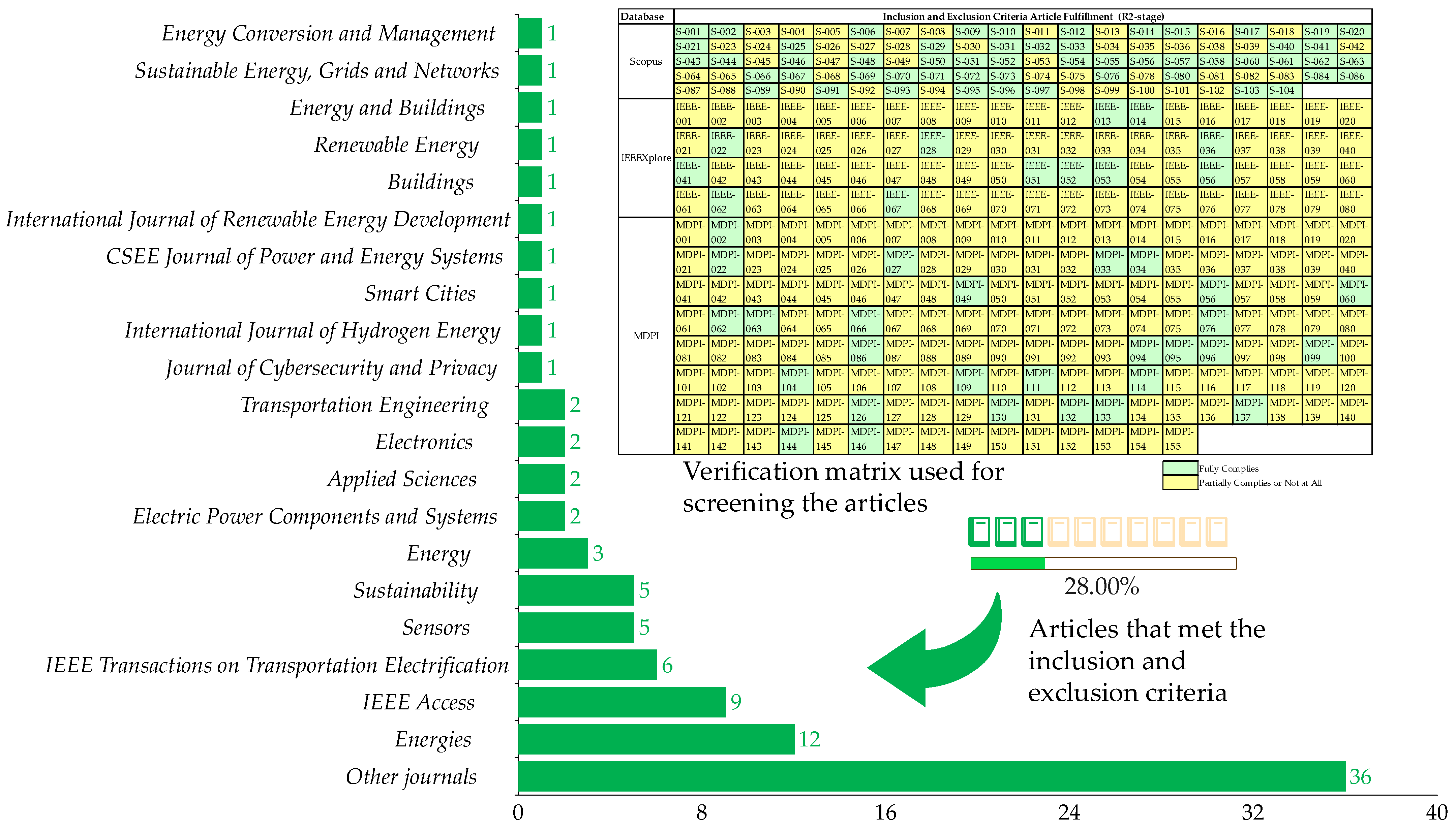
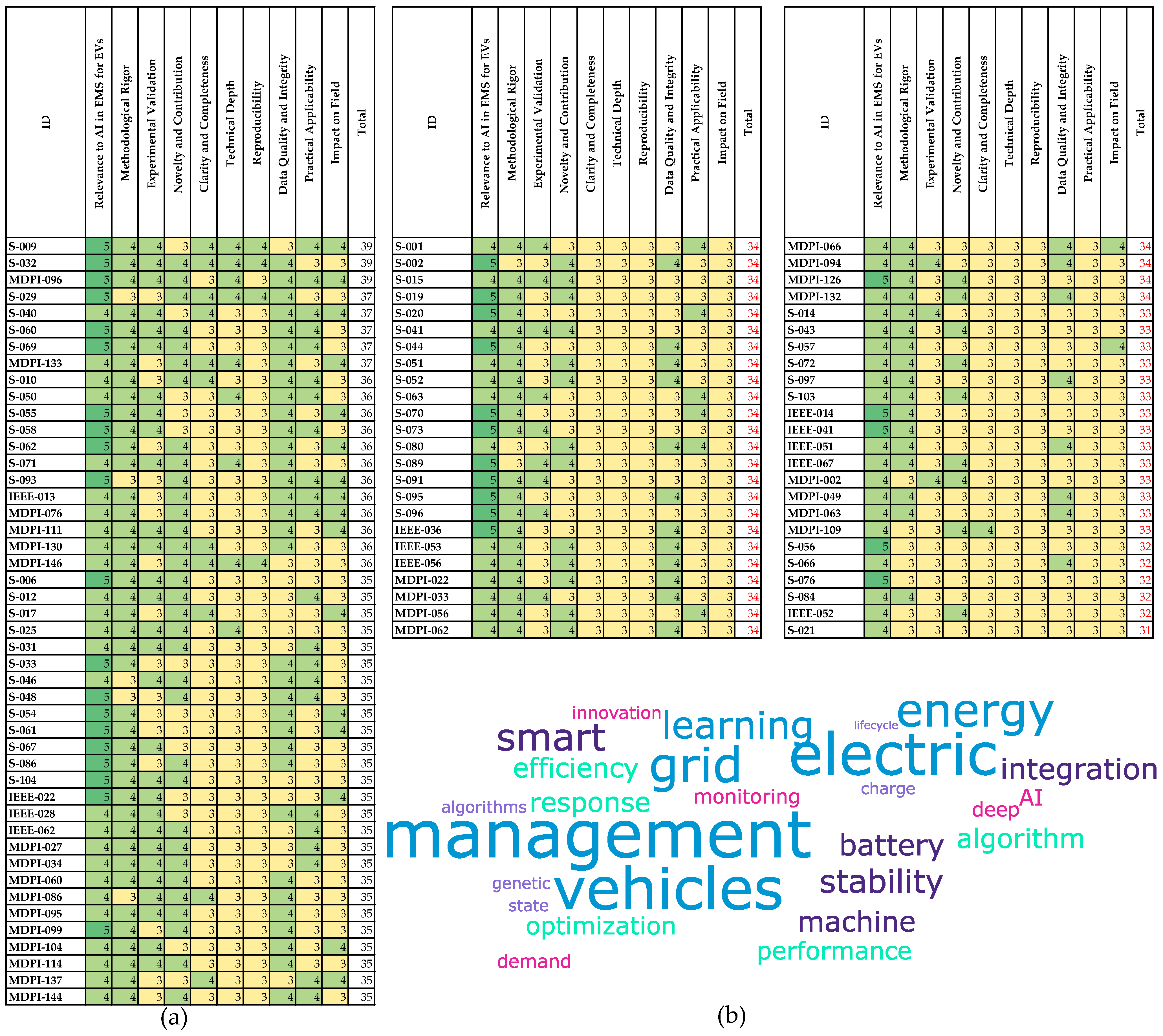
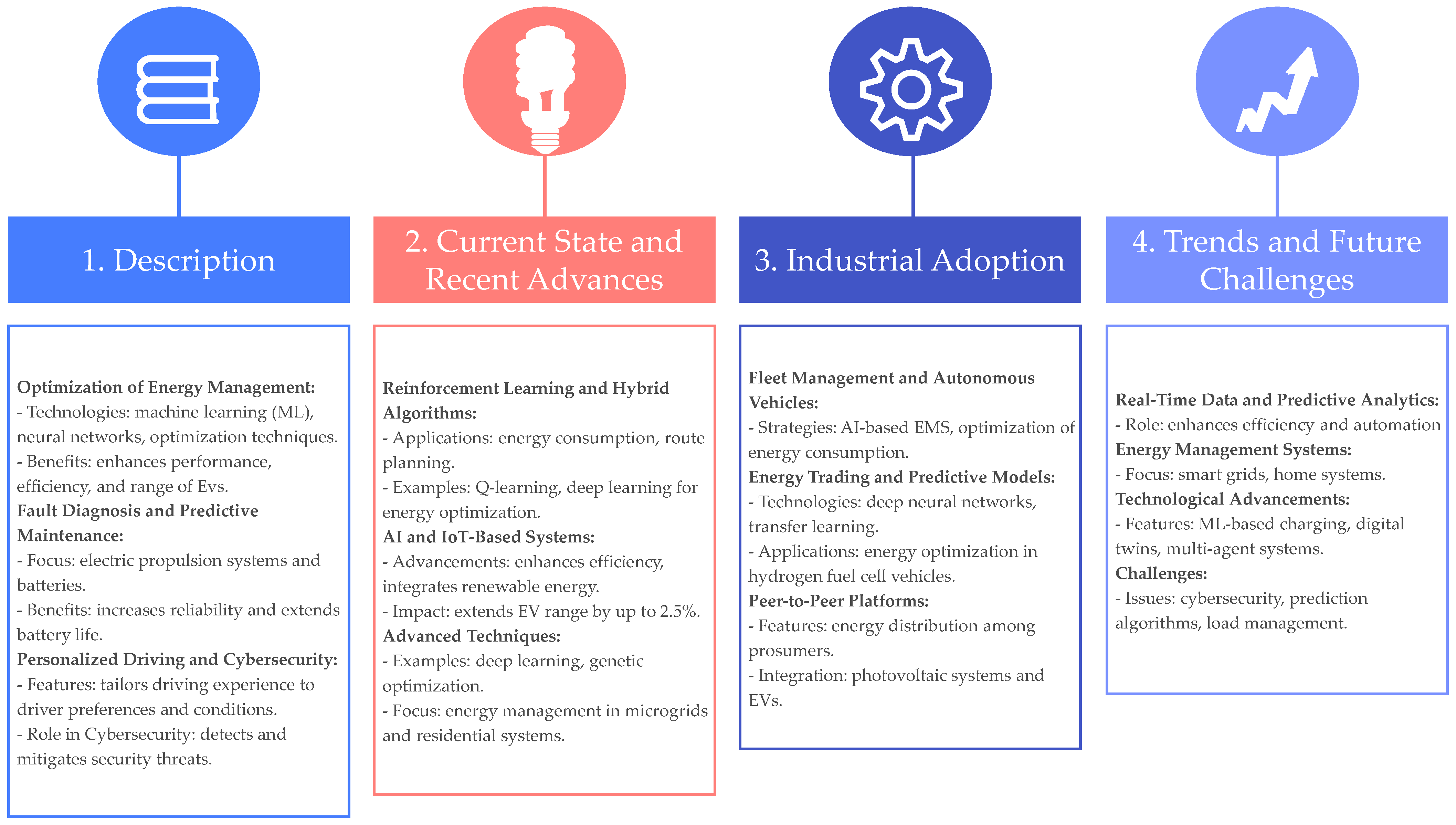
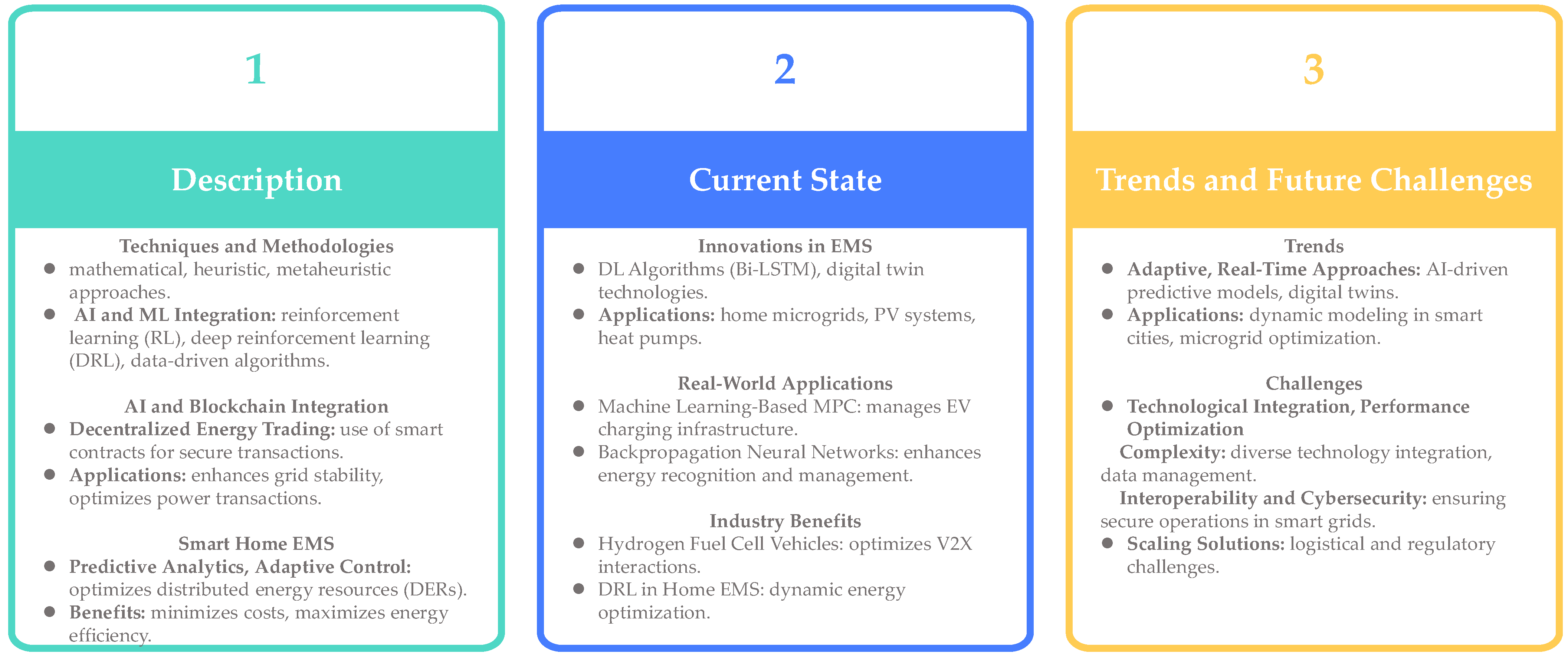

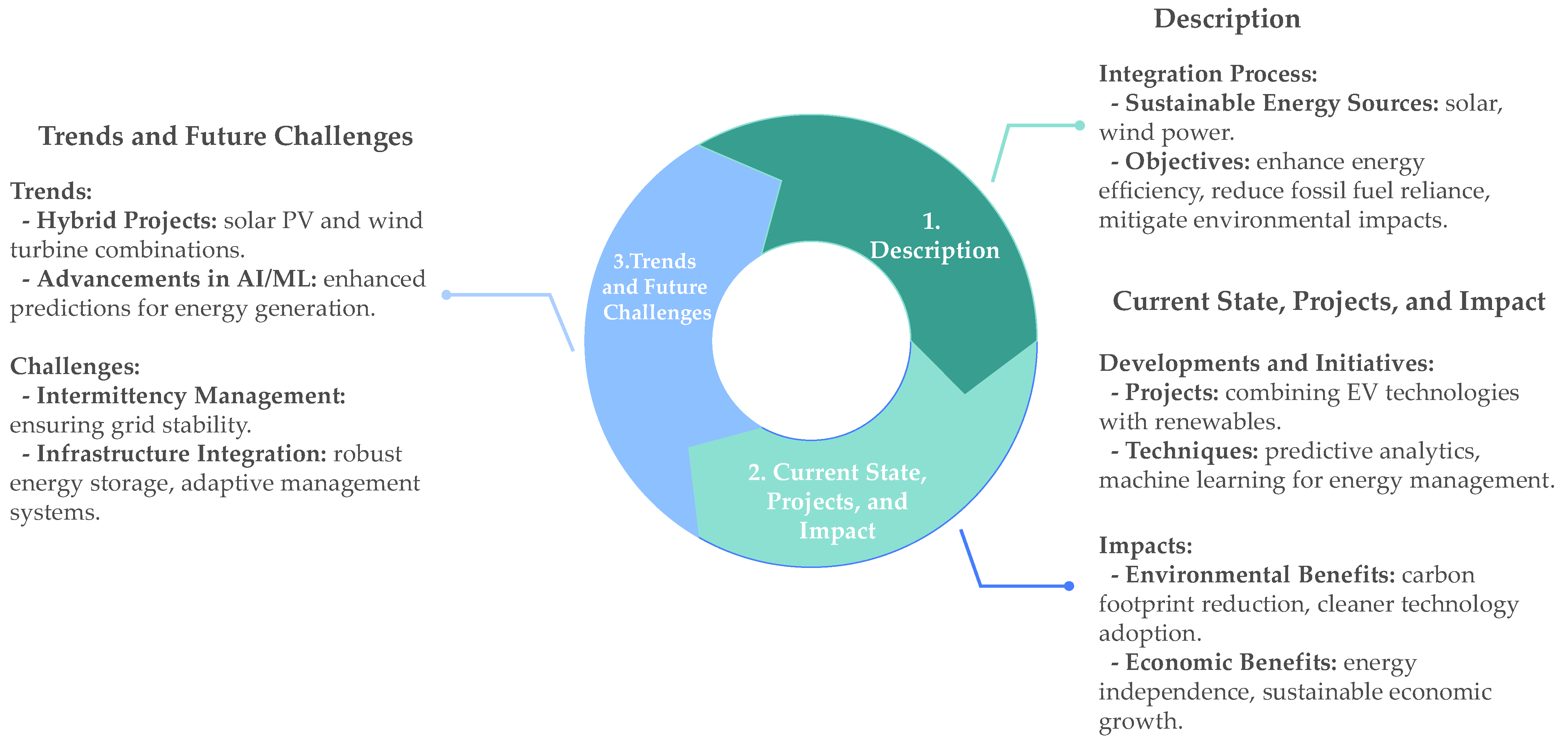

| Database | Query String |
|---|---|
| Scopus | (TITLE-ABS-KEY (“Artificial Intelligence”) AND TITLE-ABS-KEY (“EMS”) AND ALL (“EVs”)) AND PUBYEAR > 2013 AND PUBYEAR < 2025 AND (LIMIT-TO (DOCTYPE, “ar”)) AND (LIMIT-TO (LANGUAGE, “English”)) |
| IEEEXplore | (“Full Text & Metadata”:“Artificial Intelligence”) AND (“Full Text & Metadata”:“Energy Management Systems”) AND (“All Metadata”:“EVs”) Article type: Journals Year range: 2014–2024 |
| MDPI | Search text: “Artificial Intelligence”, Search Type: Full Text Logical operator: AND, Search text: “Energy Management Systems”, Search Type: Full Text Logical operator: AND, Search text: “EVs”, Search Type: All fields. Article type: Article Year range: 2014–2024 |
| Criterion | Description and Evaluation Metrics |
|---|---|
| Relevance to AI in EMSs for EVs | How well the study addresses the integration of AI techniques in energy management systems for EVs (1: peripheral, 2: somewhat, 3: relevant, 4: highly relevant, 5: central focus). |
| Methodological rigor | The robustness and appropriateness of the research methodology employed in the study (1: needs improvement, 2: fair, 3: good, 4: very good, 5: excellent). |
| Experimental validation | The extent to which the study includes experimental results, simulations, case studies, or real-world implementations (1: none, 2: limited, 3: moderate, 4: extensive, 5: comprehensive). |
| Novelty and contribution | The originality and significance of the study’s contributions to the field (1: minor, 2: low, 3: moderate, 4: significant, 5: groundbreaking). |
| Clarity and completeness | The clarity of writing and the completeness of the information provided in the study (1: needs improvement, 2: fair, 3: good, 4: very good, 5: excellent). |
| Technical depth | The level of technical detail and depth in the study (1: introductory, 2: basic, 3: adequate, 4: detailed, 5: highly detailed). |
| Reproducibility | The extent to which the study provides enough detail to allow for replication of the results (1: none, 2: limited, 3: moderate, 4: extensive, 5: comprehensive). |
| Data quality and integrity | The quality and integrity of the data presented in the study (1: poor, 2: fair, 3: good, 4: very good, 5: excellent). |
| Practical applicability | The potential for practical application of the study’s findings in real-world scenarios (1: none, 2: low, 3: moderate, 4: high, 5: very high). |
| Impact on field | The potential impact of the study’s findings on AI in energy management for EVs (1: minor, 2: low, 3: moderate, 4: significant, 5: groundbreaking). |
| N° | Item ID | Ref. | AI in EV Energy Management | Optimization Techniques in EMS | BMS | Renewable Energy Integration | Smart Grids and EVs | N° | Item ID | Ref. | AI in EV Energy Management | Optimization Techniques in EMS | BMS | Renewable Energy Integration | Smart Grids and EVs |
|---|---|---|---|---|---|---|---|---|---|---|---|---|---|---|---|
| 1 | S-009 | [27] | ✓ | ✓ | 24 | S-025 | [28] | ✓ | |||||||
| 2 | S-032 | [29] | ✓ | ✓ | ✓ | 25 | S-031 | [30] | ✓ | ✓ | |||||
| 3 | MDPI-096 | [31] | ✓ | 26 | S-033 | [32] | ✓ | ||||||||
| 4 | S-029 | [33] | ✓ | ✓ | ✓ | 27 | S-046 | [34] | ✓ | ✓ | |||||
| 5 | S-040 | [35] | ✓ | ✓ | ✓ | 28 | S-048 | [36] | ✓ | ✓ | |||||
| 6 | S-060 | [37] | ✓ | ✓ | 29 | S-054 | [38] | ✓ | ✓ | ||||||
| 7 | S-069 | [39] | ✓ | ✓ | ✓ | 30 | S-061 | [40] | ✓ | ✓ | ✓ | ||||
| 8 | MDPI-133 | [41] | ✓ | ✓ | ✓ | 31 | S-067 | [42] | ✓ | ||||||
| 9 | S-010 | [25] | ✓ | ✓ | ✓ | 32 | S-086 | [43] | ✓ | ✓ | |||||
| 10 | S-050 | [44] | ✓ | ✓ | ✓ | 33 | S-104 | [45] | ✓ | ✓ | |||||
| 11 | S-055 | [46] | ✓ | ✓ | ✓ | 34 | IEEE-022 | [47] | ✓ | ✓ | |||||
| 12 | S-058 | [48] | ✓ | ✓ | 35 | IEEE-028 | [49] | ✓ | ✓ | ||||||
| 13 | S-062 | [50] | ✓ | ✓ | ✓ | 36 | IEEE-062 | [51] | ✓ | ||||||
| 14 | S-071 | [52] | ✓ | ✓ | 37 | MDPI-027 | [53] | ✓ | ✓ | ✓ | |||||
| 15 | S-093 | [54] | ✓ | 38 | MDPI-034 | [55] | ✓ | ✓ | |||||||
| 16 | IEEE-013 | [56] | ✓ | ✓ | 39 | MDPI-060 | [57] | ✓ | ✓ | ||||||
| 17 | MDPI-076 | [58] | ✓ | ✓ | ✓ | 40 | MDPI-086 | [59] | ✓ | ✓ | ✓ | ✓ | |||
| 18 | MDPI-111 | [60] | ✓ | ✓ | 41 | MDPI-095 | [61] | ✓ | ✓ | ||||||
| 19 | MDPI-130 | [62] | ✓ | ✓ | 42 | MDPI-099 | [43] | ✓ | ✓ | ||||||
| 20 | MDPI-146 | [63] | ✓ | ✓ | ✓ | ✓ | ✓ | 43 | MDPI-104 | [64] | ✓ | ✓ | ✓ | ||
| 21 | S-006 | [65] | ✓ | ✓ | 44 | MDPI-114 | [66] | ✓ | ✓ | ✓ | ✓ | ||||
| 22 | S-012 | [67] | ✓ | ✓ | ✓ | ✓ | 45 | MDPI-137 | [68] | ✓ | ✓ | ✓ | |||
| 23 | S-017 | [69] | ✓ | ✓ | ✓ | 46 | MDPI-144 | [70] | ✓ | ✓ | ✓ | ✓ |
Disclaimer/Publisher’s Note: The statements, opinions and data contained in all publications are solely those of the individual author(s) and contributor(s) and not of MDPI and/or the editor(s). MDPI and/or the editor(s) disclaim responsibility for any injury to people or property resulting from any ideas, methods, instructions or products referred to in the content. |
© 2024 by the authors. Licensee MDPI, Basel, Switzerland. This article is an open access article distributed under the terms and conditions of the Creative Commons Attribution (CC BY) license (https://creativecommons.org/licenses/by/4.0/).
Share and Cite
Arévalo, P.; Ochoa-Correa, D.; Villa-Ávila, E. A Systematic Review on the Integration of Artificial Intelligence into Energy Management Systems for Electric Vehicles: Recent Advances and Future Perspectives. World Electr. Veh. J. 2024, 15, 364. https://doi.org/10.3390/wevj15080364
Arévalo P, Ochoa-Correa D, Villa-Ávila E. A Systematic Review on the Integration of Artificial Intelligence into Energy Management Systems for Electric Vehicles: Recent Advances and Future Perspectives. World Electric Vehicle Journal. 2024; 15(8):364. https://doi.org/10.3390/wevj15080364
Chicago/Turabian StyleArévalo, Paul, Danny Ochoa-Correa, and Edisson Villa-Ávila. 2024. "A Systematic Review on the Integration of Artificial Intelligence into Energy Management Systems for Electric Vehicles: Recent Advances and Future Perspectives" World Electric Vehicle Journal 15, no. 8: 364. https://doi.org/10.3390/wevj15080364
APA StyleArévalo, P., Ochoa-Correa, D., & Villa-Ávila, E. (2024). A Systematic Review on the Integration of Artificial Intelligence into Energy Management Systems for Electric Vehicles: Recent Advances and Future Perspectives. World Electric Vehicle Journal, 15(8), 364. https://doi.org/10.3390/wevj15080364








